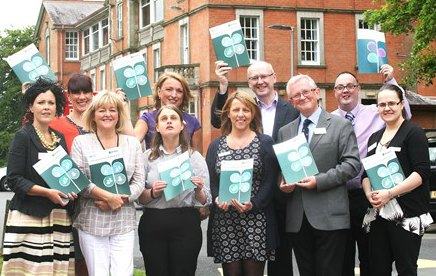
The Health and Social Care sector in Northern Ireland recently launched a new piece of Guidance for staff. The guide '
Making Communication Accessible for All: A Guide for Health & Social Care (HSC)Staff' will assist health sector staff to make sure that people using health services have access to the appropriate communication methods that they need, thus assisting disabled people in accessing services.
Development of the guide was led by the Belfast Health and Social Care Trust in partnership with the Health and Social Care Trusts, the Health and Social Care Board (HSCB), Public Health Agency (PHA), Business Services Organisation, the NI Ambulance Service and partners from the community and voluntary sectors.
Welcoming the development of this valuable guide, Orla Barron, Health and Social Inequalities Manager at Belfast Health and Social Care Trust, said:
“One in 5 people will experience communication difficulties at some point in their lives. Inclusive communication reduces barriers which are often created through people simply not knowing how to communicate effectively. This guide aims to give staff practical tips and advice that will establish good practice and mean improved health outcomes for people with communication support needs and the wider community. Producing the guide with the community and voluntary sector was essential as the partnership working meant that people with expert knowledge and first-hand experience could influence this good practice resource for staff”.
The guidance provides practical advice and support to staff by signposting for example, how to access sign language interpreters. It assists staff to think about the many different ways to effective communication i.e. speaking, writing, sign language, photographs, pictures, symbols, objects, electronic aids, as well as non-verbal communications including facial expressions, body language, sounds and gestures.
Photo caption: pictured at the recent launch at Knockbracken Healthcare Park, Belfast, are users of health and social care services, pictured with reps from Belfast, Southern and South Eastern HSC Trusts, the Equality Commission NI, the RNIB, Mencap, the Regulation and Quality Improvement Authority, and the Public Health Agency.
Libraries NI in partnership with voluntary organisations actively seeks to promote their services to disabled people and thereby increase the number of disabled people using library services. Libraries NI sees this as an important part of ensuring that disabled people can participate in the social, economic and political life of our community and is therefore an important part of being socially integrated.
Outreach initiatives taken by Libraries NI, designed to increase the participation rates of disabled clients include:
- ‘Rhythm and Rhyme’ for children with autism
- Provision of dementia friendly services
- Provision of accessible mobile libraries
- ‘Knit and Natter’ for people with mental ill health
- Craft activities for people with learning disabilities.
Making reasonable adjustments
The recently refurbished library on the Lisburn Road, Belfast, features improved disability access with disability friendly parking, ramps, handrails, automatic doors, low counters and wide walkways.